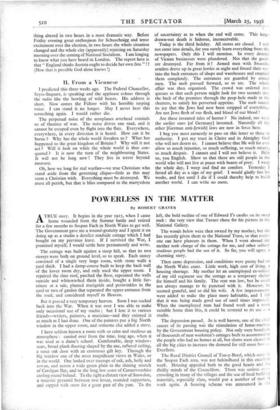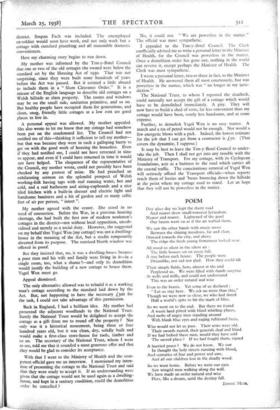POWERLESS IN THE MATTER
By ROBERT GRAVES
ATRUE story. It begins in the year 1915, when I came home wounded from the Somme- battle and retired for a few months to Sospan Fach in North Wales to get well. The Government gave me a wound-gratuity and I spent it on doing up as a studio a derelict roadside cottage which I had bought on my previous leave. If I survived the War, I promised myself, I would settle here permanently and write.
The cottage was built against a steep hill, so that its two storeys were both on ground level, so to speak. Each storey consisted of a single very large room, with stone walls a yard thick. I had a damp-course built to keep the back wall of the lower room dry, and only used the upper room. I repaired the slate roof, patched the floor, repointed the walls outside and whitewashed them inside, bought a little fur- niture at a sale, planted marigolds and periwinkles in the yard or two of garden that separated the upper entrance from the road, and considered myself in Heaven.
But it proved a very temporary heaven. Soon I was sucked back into the War. When it was over I was able to make only occasional use of my studio ; but I lent it to various friends—writers, painters, a musician—and they enjoyed it as much as I had done. One of the painters put a big North window in the upper room, and someone else added a stove.
I have seldom known a room with so calm and studious an atmosphere : carried over from the time, long ago, when it was used as a dame's school. Comfortable, deep window- seats, broad plank flooring shaped by the axe, raftered ceiling, a stout oak door with an enormous gilt key. Through the big window one of the most magnificent views in Wales, or in the world. One looked over treetops of oak, ash, holly and rowan, and across a wide green plain to the shining stretch of Cardigan Bay, and to the long low coast of Camarvonshire curling round behind. To the right a distant view of Snowdon, a majestic pyramid between two lesser, rounded supporters, and capped with snow for a great part of the year. To the left, the bold outline of one of Edward I's castles on its steep rock : the very view that Turner chose for his picture in the National Gallery.
The woods below were then owned by my mother, but she has recently given them to the National Trust, so that every- one can have pleasure in them. When I went abroad my mother took charge of the cottage for me, and other solitary studious people had the use of it. So far, you will agree, a charming story.
Then came depression, and conditions were pretty bad on the North Wales coast. Little work, high cost of living, a housing shortage. My mother let an unemployed ex-soldier of my old regiment use the cottage as a temporary shelter for himself and his family. The rent was low, but he could not always manage to be punctual with it. However, he seemed grateful, and so did his wife. A few improvements were added to make the place more habitable, and I felt that it was being made good use of until times improved. When the unemployed man had found work and a more suitable home than this, it could be restored to its use a, a studio.
The depression passed. As is well known, one of the chief causes of its passing was the stimulation of home-markets by the Government housing policy. Not only were hundreds of thousands of neat workmen's cottages built to accommodate the people who had no homes at all, but slums were cleared in all the big cities to increase the demand for still more hou Excellent.
The Rural District Council of Ton-y-Botel, which contr,13 the SOspan Path area, was not behindhind in this excellent work. Hciusing appealed both to the good hearts and the thrifty minds- of the "Councillors. There was serious m crowding in Many of the villages and the use of local build _ materials, especially slate, would put " a number of men In work again. A hoUsing scheme was announced in the district. Sospan Fach was included. The unemployed ex-soldier would soon have work, and not only work but a cottage with standard plumbing and all reasonable domestic conveniences.
Here my charming story begins to run down.
My mother was informed by the Ton-y-Botel Council that one or two of the old cottages she owned were below the standard set by the Housing Act of 193o. That was not surprising, since they were built some hundreds of years before the Act was passed. But it seemed a little absurd to include them in a " Slum Clearance Order." It is a misuse of the English language to describe old cottages on a Welsh hillside as sham property. The rooms and windows may be on the small side, sanitation primitive, and so on. But healthy people have occupied them for generations, and dean, snug, friendly little cottages at a low rent are good places to live in.
A personal appeal was allowed. My mother appealed. She also wrote to let me know that my cottage had somehow been put on the condemned list. The Council had not notified me of this—thinking it sufficient to tell my mother— but that was because they were in such a galloping hurry to get on with the good work of housing the houseless. Even if they had notified me, I could not have returned in time to appear, and even if I could have returned in time it would not have helped. The eloquence of the representative of the Council, my mother wrote, could not possibly have been checked by any protest of mine. He had preached an exhilarating sermon on the splendid prospect of Welsh working-folk having taps with real running water, hot and cold, and a real bathroom and airing-cupboards and a nice tiled kitchen with a built-in dresser and electric light and handsome banisters and a bit of garden and so many cubic feet of air per person, " inteet ".
My mother agreed with the orator. She stood in no need of conversion. Before the War, in a previous housing shortage, she had built the first row of modern workmen's cottages in the district—not without local opposition, unsub- sidised and merely as a social duty. However, she suggested on my behalf that Ysgol Wen (my cottage) was not a dwelling- house in the meaning of the Act, but a studio temporarily diverted from its purpose. The outsized North window was offered in proof.
But they insisted that, no, it was a dwelling-house because a poor man and his wife and family were living in it—in a single room, too, what a shame 1—and only its demolition would justify the building of a new cottage to house them. Ysgol Wen must go.
Appeal dismissed.
The only alternative allowed was to rebuild it as a working man's cottage according to the standard laid down by the Act. But, not happening to have the necessary 130o for the task, I could not take advantage of this permission.
Back in England, I had a brilliant idea. My mother had presented the adjacent woodlands to the National Trust. Surely the National Trust would be delighted to accept the cottage as a gift from me to round off the property ? Not only was it a historical monument, being three or four hundred years old, but it was clean, dry, solidly built and would make a first-class store-house for tools, timber and so on. The secretary of the National Trust, whom I went to see, told me that it sounded a most generous offer and that they would be glad to consider its acceptance.
With that I went to the Ministry of Health and the com- petent official gave me an interview. I mentioned my inten- tion of presenting the cottage to the National Trust and said that they were ready to accept it. If an understanding were given that the cottage would not be used again as a dwelling- house, and kept in a sanitary condition, could the demolition order be cancelled ? No, it could not. " We are powerless in the matter." The official was most sympathetic.
I appealed to the Ton-y-Botel Council. The Clerk unofficially advised me to write a personal letter to the Minister of Health, for the Council was powerless in the matter. Once a demolition order has gone out, nothing in the world can reverse it, except perhaps the Minister of Health. The Clerk was most sympathetic.
I wrote a personal letter, two or three in fact, to the Minister of Health. He answered them all most courteously, but was powerless in the matter, which was " no longer in my juris- diction."
The National Trust, to whom I reported the deadlock, could naturally not accept the gift of a cottage which would have to be demolished immediately. A pity. They will now have to build a shed of sorts, far less convenient than my cottage would have been, surely less handsome, and at some expense.
Further, to demolish Ysgol Wen is no easy matter. A match and a tin of petrol would not be enough. Nor would a few energetic blows with a pick. Indeed, the lowest estimate for the job that I can get from a contractor is £50. (That covers the dynamite, I suppose.) It may be best to leave the Ton-y-Botel Council to under- take the job. Then I shall not get into any trouble with the Ministry of Transport. For my cottage, with its Cyclopean foundations, acts as a buttress to the road which carries all the coastal traffic. The conscientious removal of Ysgol Wen will seriously offend the Transport officials—when reports reach them of lorries and 'buses bouncing down the hillside at the point where my cottage used to stand. Let us hope that they will not be powerless in the matter.











































































 Previous page
Previous page